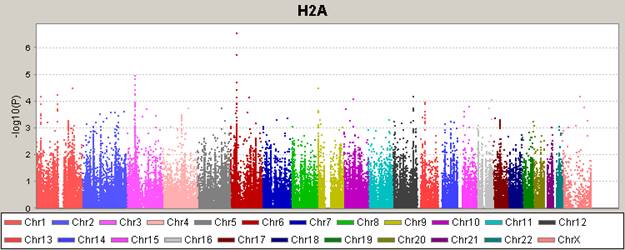Session Information
Session Type: Abstract Submissions (ACR)
Background/Purpose: ACPA antibody specificities to citrullinated autoantigens (e.g., histones, vimentin, fibrinogen) are associated with the preclinical phase of RA and may predict the onset of synovitis. However, it is not known whether individual antibody response to different citrullinated peptides has a genetic basis. Here we report that non-HLA polymorphisms known to be associated with autoimmune disease are associated with ACPA specificities in African-Americans with RA.
Methods: 449 (RF+ or anti-CCP+) African-American RA patients genotyped on the Immunochip array (~200K SNPs from a variety of autoimmune diseases) were analyzed. 90% individual and 98.5% SNP call rates were used as quality control thresholds. Using a custom Bio-Plex™ bead-based autoantibody assay platform, we measured autoantibodies targeting different RA associated citrullinated autoantigens: vimentin, fibrinogen, histone 2A (H2A), histone 2B (H2B), and apolipoprotein A1 (Apo A1). Linear regression was used to fit models of ln (ACPA Ab) conditional on sex, disease duration, proportion European admixture and minor allele copies for ~167K markers that met quality control.
Results: In addition to an association with the MHC region (known to be associated with ACPA+ RA), we found additive allelic effects on anti-citrullinated H2A (anti-cit H2A) indicating a strong association in a non-MHC region on chromosome 3 (Figure 1). For anti-cit H2A and anti-cit H2B there were 43 and 48 associations, respectively, with p value < 0.001 between 45.9 and 46.4 Mb. The association signal with strong LD support was verified for both anti-cit H2A (Figure 2) and anti-cit H2B. The strongest SNP association was rs4683166 (MAF = 0.45) for both anti-cit H2A (p-value= 1.5e-05) and anti-cit H2B (p-value = 1.0e-05), and indicated an increasing relationship of minor alleles (G) and Ab concentration. In addition, rs4683166 was associated with anti-cit vimentin (p=0.0045), and anti-cit ApoA1 (p=0.024), but not anti-cit fibrinogen (p=0.15). rs4683166 was not associated with RA suceptibility (p-value = 0.18 for difference in MAF between 662 RA cases and 876 African-American controls).
Conclusion: The presence of antibodies to citrullinated autoantigens appears to have a strong non-MHC association near the XCR1 chemokine receptor on human chromosome 3. These results suggest there may be a significant genetic basis for disease specific antibodies in RA.
Figure 1. Manhattan plot of loci associated with serum anti-cit H2A levels.
Figure 2. Zoomplot indicating the strongest chr 3 association signal.
Disclosure:
R. J. Reynolds,
None;
M. I. Danila,
None;
J. Sokolove,
None;
W. H. Robinson,
None;
D. L. Conn,
None;
B. L. Jonas,
None;
L. F. Callahan,
None;
L. W. Moreland,
None;
R. D. Brasington,
None;
E. A. Smith,
None;
P. K. Gregersen,
None;
S. L. Bridges Jr.,
None.
« Back to 2013 ACR/ARHP Annual Meeting
ACR Meeting Abstracts - https://acrabstracts.org/abstract/chemokine-receptor-polymorphisms-on-chromosome-3-are-associated-with-anticitrullinated-protein-antibody-specificities-in-african-americans-with-rheumatoid-arthritis/


